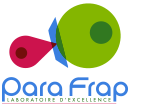

 |
Cyrille BOTTÉ |
|
|
Information |
||
| Institute of Advanced Biosciences | ||
| Apicolipid: Membrane biogenesis, lipid synthesis and nutrient acquisition of Apicomplexan parasites and their human host cells | ||
| Grenoble | ||
| 0000-0002-2245-536X | ||
| This email address is being protected from spambots. You need JavaScript enabled to view it. | ||
| https://iab.univ-grenoble-alpes.fr/ | ||
| @ApicoLipid | ||
|
Scientific interests and projects |
||
|
The research team I currently lead (https://NotAllowedScript69915c6e75d0etwitter.com/ApicoLipid @ApicoLipid) as CNRS Research Director focuses on understanding how Apicomplexan parasites acquire lipids and nutrient essential for their propagation and survival within their host cells. Apicomplexa are unicellular eukaryotes and pathogenic agents responsible for major human diseases such as Toxoplasmosis, major chronic disease affecting ~1/3 of the world population and a lethal threat to immunocompromised patients, and (ii) malaria affecting 250 millions people/year, killing ~1/2million/year, mainly children. The renewal of our therapeutic arsenal needed for the eradication of these diseases depends on deciphering metabolic pathways that sustain parasite survival within the host and its environment. Current evidences all point at lipid synthesis and membrane biogenesis as crucial pathways for parasite intracellular development. Major biological questions remain and focus our current attention (i) how are lipids acquired, remodelled and trafficked from the host cell to the parasite and between parasite intracellular compartments? (ii) what is the input of scavenged vs de novo synthesised lipids? (iii) what are the mechanisms of lipid fluxing and trafficking from these two pathways? (iv) how does parasites sense and regulate these pathways to adapt to physiological changes of host nutritional and environmental conditions? (v) what are the parasite lipid signals required for intracellular development? Our laboratory have set up major facilities and equipements that includes a P3* cell culture facility (MESRI-HCB), and a fully independent lipidomic-fluxomic platform encompassed within our P3* (http://gemeli-uga.fr/GEMELI.html), both parts of the core facilities of our Institution at the Université Grenoble Alpes. Our robust expertise and facilities thus allows us to conduct large metabolomics and lipidomics analyses beyond our central scope, on infectious diseases and other models, to determine metabolic signatures or monitoring metabolite fluxes. We currently lead major collaborative projects with national and international partners (LIA University Melbourne/WEHI, CEFIPRA ICGEB New Dehli…). |
||
|
Top 5 publications of the last 5 years |
||
|
1. Amiar S, Katris NJ, Berry L, Dass S, Shears MJ, Brunet C, Touquet B, McFadden GI, Yamaryo-Botté Y*, Botté CY*. (2019) Division and adaptation to host nutritional environment of apicomplexan parasites depend on apicoplast lipid metabolic plasticity and host organelles remodelling, Accepted in Cell Reports, (CELL-REPORTS-D-19-01152) 2. Dubois D, Fernandes S, Amiar S, Dass S, Katris NJ, Botté CY*, Yamaryo-Botté Y*. (2018)(*colast and corresponding) Toxoplasma gondii acetyl-CoA synthetase is involved in fatty acid elongation (of long fatty acid chains) during tachyzoite life stages. J Lipid Res. 59(6):994-1004 3. Shears MJ, MacRae JI, Goodman DG, Mollard VSU, Botté CY *, McFadden GI*. (2017) (*co-last) Characterization of the Plasmodium falciparum and P. berghei glycerol-3-phosphate acyltranferase involved in FASII fatty acid utilization in the malaria parasite apicoplast. Cellular Microbiology 19(1) 4. Amiar S, MacRae JI, Callahan DL, vanDooren GG, Shears MJ, Dubois D, Cesbron-Delauw MF, Maréchal E, McConville MJ, McFadden GI, Yamaryo-Botté Y*, Botté CY *. (2016) The Toxoplasma gondii apicoplast is responsible for bulk phospholipid synthesis mainly via a plantlike glycerol 3-phosphate acyltransferase for lysophosphatidic acid precursor assembly. Plos Pathogens 4;12(8):e1005765 5. Bullen H+, Jia Y+, Yamaryo-Botté Y, Klages J, Carruthers V, Botté CY, Soldati-Favre D. (2016) . Phosphatidic acid-mediated signaling is essential for microneme secretion in Toxoplasma. Cell Host and Microbe 9;19(3):349-60 |
||
The INSERM workshop “Modern methods in molecular parasitology” will take place in Montpellier, France, from 4–6 November 2026. This event will bring together leading experts in...
The 15th CAPF (French Anti-Parasitic and Anti-Fungal Consortium) workshop will take place on 16–17 March 2026 in Strasbourg (France). This event is an excellent opportunity for students and postdoctoral researchers to participate and contribute...
Call for Applications: New Junior Research Groups at Institut Pasteur The Institut Pasteur has launched an international call to recruit new junior group leaders.This is a unique opportunity for high-potential scientists to...
JOB : Ingénieur·e d’étude / Research Engineer – Mosquito Immunity (IBMC, Strasbourg) 🇫🇷 Le laboratoire Mosquito Immune Responses recrute un·e ingénieur·e d’étude à l’IBMC (Strasbourg). La personne recrutée sera en...
Applications are now open for the 2026 Biology of Parasitism (BoP) course, taking place June 12–July 23, 2026 at the Marine Biological Laboratory in Woods Hole, MA.This intensive 6-week program offers PhD students and postdocs advanced training in...
Newcastle University offers a full-time, fixed-term position (3 years) for a Research Assistant or Research Associate in Molecular Parasitology — funded by the Medical Research Council (MRC). About the Opportunity Location:...
Multidisciplinary PhD opportunity in the fields of infectious diseases, gene regulations and molecular signalisation. Fully Funded 4-Year PhD at the University of York A fully funded PhD opportunity is available at the...
The EMBO Workshop 2025 “Host–Parasite Relationship: From Mechanisms to Control Strategies”, took place from October 5–8, 2025, on the beautiful Île des Embiez (France). Organized within the framework of the LabEx ParaFrap and...
Postdoc (M/F) in molecular and biochemical parasitology (Toxoplasma gondii) A 24-month post-doctoral position starting on January 2026 and funded by the French National Research Agency (ANR) is available in the in the...
Postdoc (M/F) Molecular and cell biology in Trypanosoma brucei A 24-month post-doctoral position starting on November 1st 2025 (or before) and funded by the French National Research Agency (ANR) is available in the...

© 2023. All rights reserved MLCOM
Notre site LabEx ParaFrap utilise des cookies pour réaliser des statistiques de visites, partager des contenus sur les réseaux sociaux et améliorer votre expérience. En refusant les cookies, certains services seront amenés à ne pas fonctionner correctement. Nous conservons votre choix pendant 30 jours. Vous pouvez changer d'avis en cliquant sur le bouton 'Cookies' en bas à gauche de chaque page de notre site. En savoir plus
Ce site utilise des cookies pour assurer son bon fonctionnement et ne peuvent pas être désactivés de nos systèmes. Nous ne les utilisons pas à des fins publicitaires. Si ces cookies sont bloqués, certaines parties du site ne pourront pas fonctionner.
Ce site utilise des cookies de mesure et d’analyse d’audience, tels que Google Analytics et Google Ads, afin d’évaluer et d’améliorer notre site internet.
Ce site utilise des composants tiers, tels que NotAllowedScript69915c6e755a8ReCAPTCHA, Google NotAllowedScript69915c6e750f6Maps, MailChimp ou Calameo, qui peuvent déposer des cookies sur votre machine. Si vous décider de bloquer un composant, le contenu ne s’affichera pas
Des plug-ins de réseaux sociaux et de vidéos, qui exploitent des cookies, sont présents sur ce site web. Ils permettent d’améliorer la convivialité et la promotion du site grâce à différentes interactions sociales.
Ce site web utilise un certain nombre de cookies pour gérer, par exemple, les sessions utilisateurs.

